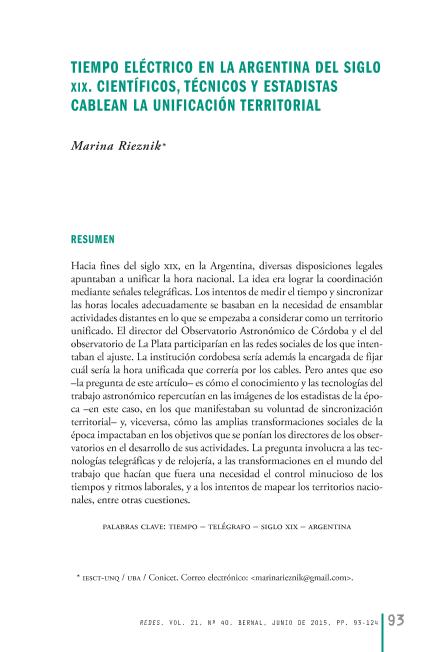Mostrar el registro sencillo del ítem
dc.contributor.author
Rieznik, Marina Andrea

dc.date.available
2019-03-11T20:32:34Z
dc.date.issued
2015-12
dc.identifier.citation
Rieznik, Marina Andrea; Tiempo eléctrico en la Argentina del siglo XIX: Científicos, técnicos y estadistas cableando la unificación territorial; Universidad Nacional de Quilmes; Redes; 21; 40; 12-2015; 30-65
dc.identifier.issn
0328-3186
dc.identifier.uri
http://hdl.handle.net/11336/71416
dc.description.abstract
Hacia fines del siglo XIX, en la Argentina, diversas disposiciones legales apuntaban a unificar la hora nacional. La idea era lograr la coordinación mediante señales telegráficas. Los intentos de medir el tiempo y sincronizar las horas locales adecuadamente se basaban en la necesidad de ensamblar actividades distantes en lo que se empezaba a considerar como un territorio unificado. El director del Observatorio de Córdoba y el de La Plata participarían en las redes sociales de los que intentaban el ajuste. La institución cordobesa sería además la encargada de fijar cuál sería la hora unificada que correría por los cables. Pero antes que eso, la pregunta de este artículo, es cómo el conocimiento y las tecnologías del trabajo astronómico repercutían en las imágenes de los estadistas de las época - en este caso en los que manifestaban su voluntad de sincronización territorial- y, viceversa, cómo las amplias transformaciones sociales de la época impactaban en los objetivos que se ponían los directores de los observatorios en el desarrollo de sus actividades. La pregunta involucra a las tecnologías telegráficas y de relojería; a las transformaciones en el mundo del trabajo que hacían que sea una necesidad el control minucioso de los tiempos y ritmos laborales y a los intentos de mapear los territorios nacionales, entre otras cuestiones.
dc.description.abstract
At the end of xix century, several legal dispositions were draw in Argentina in order to unify national time standard. The goal was to reach coordination through telegraphic signals. The intents to measure time as well as appropriately synchronize local times were based on the need for coordinating distant activities across a vast area that was starting to be considered as a unified territory. The directors of Observatories at Cordoba and La Plata participated in the social networks of people that were trying to carry out this adjustment. The institution from Cordoba was to be also in charge of fixing a unified time standard, which was going to run over the telegraphic wires.
But, before that, the main questions for this paper are about the way that astronomic knowledge and labour technologies had an impact on the statesman from that era –in this case, meaning the ones who displayed their will for a national synchronization– and vice versa, the way in which the wide social transformations from that time had an impact on the targets set by the directors of the observatories while developing their activities. These questions involves both telegraphic and clock making technologies; the transformations in the labour world –which made it necessary to minutely control times and rhythms during the working day; and the intents of mapping the national territories, among other issues.
dc.format
application/pdf
dc.language.iso
spa
dc.publisher
Universidad Nacional de Quilmes

dc.rights
info:eu-repo/semantics/openAccess
dc.rights.uri
https://creativecommons.org/licenses/by-nc-sa/2.5/ar/
dc.subject
Argentina
dc.subject
Siglo Xix
dc.subject
Mediciones
dc.subject
Tiempo
dc.subject.classification
Historia

dc.subject.classification
Historia y Arqueología

dc.subject.classification
HUMANIDADES

dc.title
Tiempo eléctrico en la Argentina del siglo XIX: Científicos, técnicos y estadistas cableando la unificación territorial
dc.title
Electric time at 19th century Argentina: scientists, technicians and statesmen wiring territorial unification
dc.type
info:eu-repo/semantics/article
dc.type
info:ar-repo/semantics/artículo
dc.type
info:eu-repo/semantics/publishedVersion
dc.date.updated
2019-02-25T19:51:48Z
dc.journal.volume
21
dc.journal.number
40
dc.journal.pagination
30-65
dc.journal.pais
Argentina

dc.journal.ciudad
Buenos Aires
dc.description.fil
Fil: Rieznik, Marina Andrea. Universidad Nacional de Quilmes; Argentina. Universidad de Buenos Aires; Argentina. Consejo Nacional de Investigaciones Científicas y Técnicas; Argentina
dc.journal.title
Redes

dc.relation.alternativeid
info:eu-repo/semantics/altIdentifier/url/https://ridaa.unq.edu.ar/handle/20.500.11807/377
Archivos asociados
